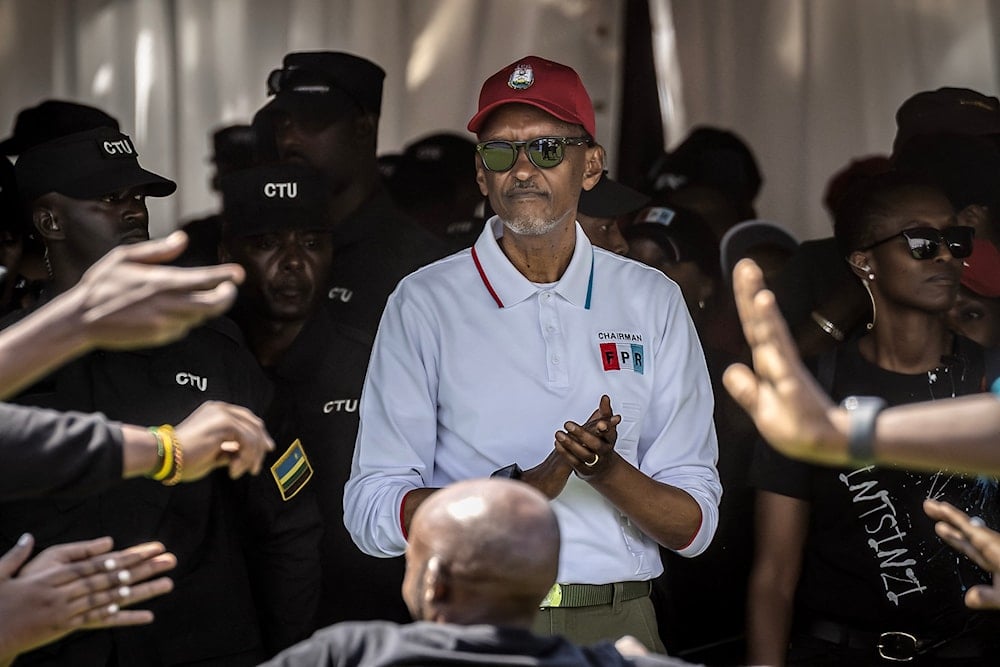Polls open in Rwanda, incumbent Kagame widely expected to extend rule
Incumbent President Paul Kagame seeks a fourth seven-year term, following a 2015 constitutional amendment that extended presidential term limits.
-

Incumbent President of Rwanda and Rwandan Patriotic Front (RPF) presidential candidate Paul Kagame arrives at his final campaign rally in Kigali, on July 13, 2024, ahead of the 2024 Rwandan general election. (AFP)
Polling stations opened on Monday across Rwanda for presidential and parliamentary elections, in which Paul Kagame is widely anticipated to extend his leadership of the central African nation.
This marks the fourth presidential election since the genocide 30 years ago that claimed the lives of more than 800,000 people, primarily from the Tutsi ethnic minority.
Kagame, who commanded the Rwandan Patriotic Front (RPF) in defeating Hutu extremists and ending the genocide, was appointed president by parliament in 2000 following the resignation of Pasteur Bizimungu. He has since secured over 90% of the vote in the 2003, 2010, and 2017 elections.
Kagame seeks a fourth seven-year term, following a 2015 constitutional amendment that extended presidential term limits. He is praised for transforming Rwanda into a united nation and a regional business hub, though critics argue that his administration suppresses free speech and human rights in the country of 13 million, of whom more than nine million are eligible to vote in Monday’s election.
Abroad, Rwanda faces accusations of destabilizing the neighboring Democratic Republic of Congo. A UN report alleges that Rwandan troops are collaborating with M23 rebels in the conflict-ridden eastern region of the country.
The incumbent president’s opponents in this election include Frank Habineza of the Democratic Green Party of Rwanda and independent candidate Philippe Mpayimana, both of whom he faced in 2017. Rwanda’s national electoral commission disqualified six other candidates, including prominent Kagame critics Victoire Ingabire, Diane Rwigara, and Bernard Ntaganda.
Kagame's campaign has focused on themes of security, stability, unity, and economic development.
“We chose to rebuild ourselves and our country, which was destroyed by bad politics and irresponsible leaders,” he stated at a rally in Gakenke on Thursday.
“As for you, you have rebuilt yourselves, you have built your skills, and you have competent leaders at all levels. Therefore, you must do everything possible to ensure that Rwanda continues its path towards sustainable progress.”
Habineza, a former RPF member, is campaigning for tax and land policy reforms and the modernization of agriculture.
Mpayimana, a senior expert in the Ministry of National Unity and Civic Engagement and a former journalist, advocates for downsizing parliament, increasing agricultural productivity, and improving education and student welfare. Both candidates received less than 1% of the vote in the last election.
Ahead of the election, Amnesty International reported that Rwanda's opposition faces "severe restrictions... as well as threats, arbitrary detention, prosecution, trumped-up charges, killings, and enforced disappearances."
Analysts suggest that Habineza and Mpayimana lack the name recognition, financial resources, and organizational capacity to pose a significant challenge to Kagame this time around. The RPF has been the ruling party since 1994 and holds 75% of the parliamentary seats.
The Guardian cited David Kiwuwa, an associate professor at the University of Nottingham, as saying that Rwanda operates as a dominant party system with the RPF occupying a predominant political space, leaving no foreseeable challengers.
Additionally, Rwandans are voting for members of the lower house of parliament, with election results expected later in the week.

 3 Min Read
3 Min Read








